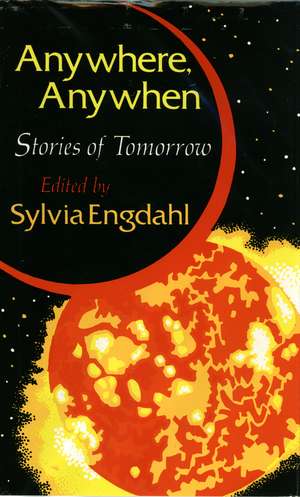
Not All Stories About the Future
Should Be Called Science Fiction
by Sylvia Engdahl
Here is the introduction to the ebook edition of Anywhere, Anywhen, which contains all the stories in
the hardcover edition plus two from Universe Ahead: Stories of Tomorrow and one story not previously published. It includes all of my short fiction.
by Sylvia Engdahl
Here is the introduction to the ebook edition of Anywhere, Anywhen, which contains all the stories in the hardcover edition plus two from Universe Ahead: Stories of Tomorrow and one story not previously published. It includes all of my short fiction.*
This is a book for teens about the future--or at least, about things that might happen in the future. Usually, all such stories are called “science fiction.” But that is often a misleading label, not only because some science fiction has nothing about science in it, but because different readers have different ideas of what science fiction is. Even experts in the field of SF do not agree in their definitions of it. I myself would prefer not to categorize this book as “science fiction.” I feel that to do so gives the impression that it is a book meant for a special group of readers with special background, when actually it is intended for readers who usually avoid that genre.
Personally, I do not believe that the future is something that should be set apart and mentioned only in literature of one particular type, directed to one specific audience. To me, past, present and future are all parts of an unbroken thread, the thread of human experience. Almost everybody is interested in the future. All of the authors represented here are interested in it, although most of them had not happened to write about it before. When I asked them to contribute to this volume, I did not ask them to adopt the traditions of the SF genre; instead, I asked for stories that readers of their previously published fiction would enjoy.
I do not mean to imply that I don’t admire good science fiction or that I question its literary value. But tastes differ, and books published in that genre simply do not appeal to everybody, because to please that audience they must take into account what its fans have read before, as well as their interest in ideas far removed from everyday life. There are many other people with the opposite preference--and those people don’t even look at books on the “science fiction” shelves of libraries or bookstores.
 Original publsher's edition, 1976.
Original publsher's edition, 1976.
Librarians not familiar with science fiction praised the book, and each of the stories--they are all quite different from each other--was singled out as the favorite of different reviewers. Unfortunately, since these were internal reviews from separate schools and library systems, they were not seen elsewhere and couldn’t be quoted in blurbs. As a result, Anywhere, Anywhen was the only book of mine that didn’t earn its initial advance. I hope that this time around, it will be found by the sort of readers that the authors had in mind.
In one sense the stories included here are about future or imaginary worlds, yet in another sense, no story is really about the world in which its action takes place. Authors write not about worlds, but about people. The people in a story are more important than where--or when--they live. Of course, the ways people live in the future will not be like the ways they live now, and the differences will be greater than the obvious ones like development of interplanetary travel and new inventions. If authors could actually foresee the future, they would see much that would seem strange. Science fiction is made to seem as strange as possible for that reason; some readers feel that to show tomorrow’s ways as similar to today’s is unrealistic. But for many others, strangeness serves to separate SF from real life. I believe that stories for the mainstream readers of today should seem “real” today, even when they are about people of tomorrow. Strange accounts of strange, imaginary ways are not pictures of real life, alter all. Differences between present and future imagined merely for the sake of strangeness are no closer to tomorrow’s reality than similarities that aren’t apt to exist.
Furthermore, some similarities will exist. Despite the passage of time, certain things never change. Customs vary from place to place and from era to era, yet human feelings stay the same. The importance of human beings remains the same, even on different worlds, and even, perhaps, among human races different from the human race of planet Earth.
The stories in this book are not meant to be “true” in the sense of being predictions. Nevertheless, I think that they do have truth in them. No author can predict what the future is going to bring. Realizing that, we who’ve contributed to this book have chosen not to speculate too much about the details of what we don’t know, and to focus instead on what we do know, what we believe has lasting significance: the unchanging truths about how people feel and what they value. Truth of this kind applies, and will always apply, anywhere and anywhen.
Copyright 1976, 2011 by Sylvia Engdahl
All rights reserved.
This essay is included in my ebook Reflections on Enchantress from the Stars and Other Essays